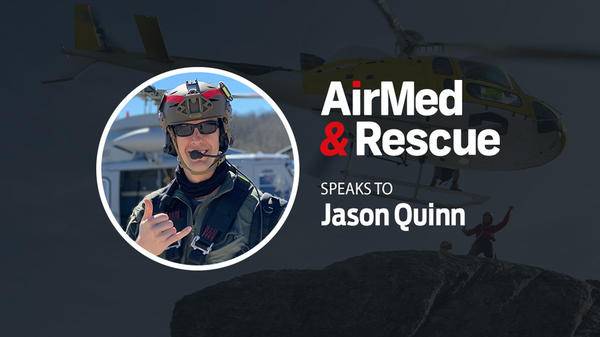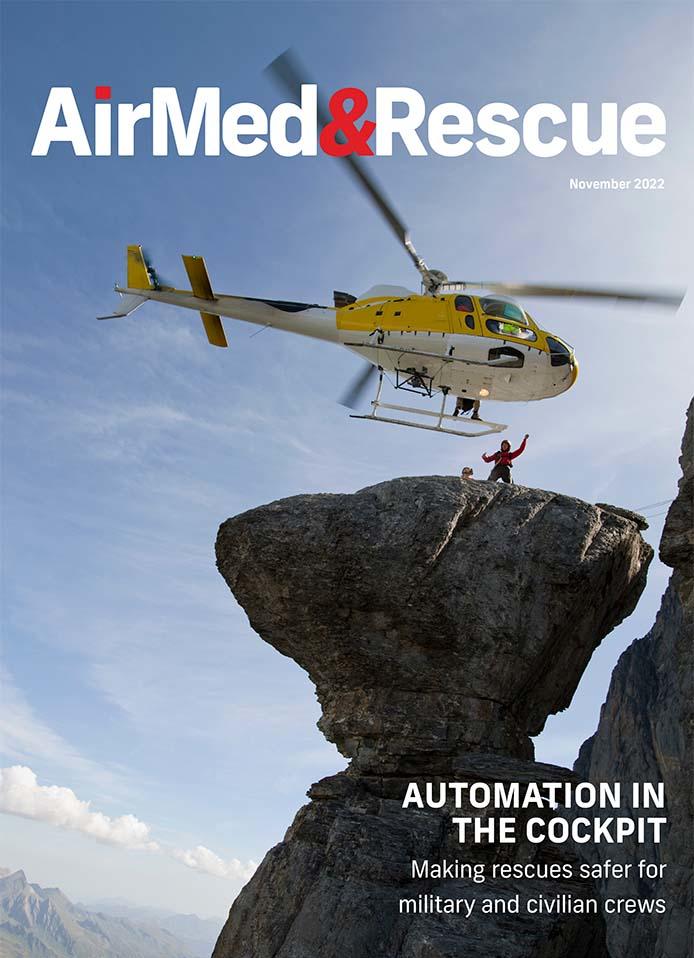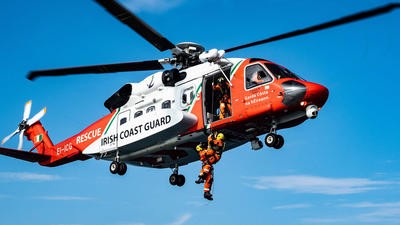Interview: Jason Quinn, The Real ResQ Podcast Host

Jason Quinn talks to Kate McLaughlin about his path to becoming a Rescue Swimmer, and what inspired the creation of The Real ResQ Podcast
I had an amazing childhood, growing up on a lake in a small country town in Massachusetts. With the four seasons in New England, I took advantage of activities during each one. There was snowboarding, ice skating and basketball in the winter; water skiing, boating, and of course swimming in the summer. Plus, there was hiking and camping, and everything else in-between. No matter what, I was always looking for the next adventure, the next adrenaline rush. I would say that everything I did then, set me up for what I do now. When I was getting ready to graduate high school, I looked into university, but it wasn’t really for me. My uncle, who was in the US Coast Guard (USCG), brought me to USCG Station Boston for a day. It was then that I decided I wanted to join their organization.
I had no idea what impact joining the USCG would have on the rest of my life. It was in bootcamp, after watching a quick video on the Aviation Survival Technician (AST) rate, that I decided to be a Rescue Swimmer. After a two-year tour with the USCG Ceremonial Honor Guard in Washington DC, I entered AST ’A’ School (Rescue Swimmer training). To this day, it was the hardest thing I have done. When you go through that type of training at a young age, you are still learning what you, your body, and your mind can take in pain and discomfort. It’s a pretty simple concept really, and that is, DON’T QUIT! I have heard that saying more often than not on the podcast from many guests. Similar to ‘embrace the suck’, ‘keep your composure and finish the job’ and ‘if you can get out of the pool and walk to the barracks, you can do another lap’.
The day I graduated from AST ‘A’ School/Rescue Swimmer training with my six other classmates was one I will never forget. It was a great feeling of accomplishment, yet it was only the beginning.
It depends on what stage you’re at. The first is graduating from AST ‘A’ School/Rescue Swimmer training. However, like I said, that’s just the beginning. All you really know at that point are the basics. Nonetheless, it’s the first big challenge. You’re yelled at. You’re pushed harder than you think you can go. You’re expected to overcome your mind telling you no. You must adapt and overcome all obstacles. The reward is having the confidence to take on anything. You earn that right to be called a USCG Rescue Swimmer.
Challenge number two is passing Emergency Medical Technician (EMT) – basic training. For some people, they can look at that and think, ‘no problem’. For me, I had a tough time. I failed my first national registry test, which was not good. This meant I was not qualified to be on ready crew status. The feeling of sitting on the sidelines because you’re not able to ‘stand the watch’ (be on call) is tough. So, over the next couple of weeks, I worked hard studying to be able to pass that test. Happily, I succeeded the second time. I’m also happy to say that I didn’t stop there – I went on to complete my EMT-Paramedic certification.

Challenge number three comes in a multitude of ways. You have to prove yourself. It’s funny when I say that, because I had just graduated from the hardest school in the USCG, which has a 60 to 75 per cent dropout rate. Then I studied my butt off to become an EMT-B. Now I have to prove myself again?
You see, after you graduate from Rescue Swimmer school, it doesn’t end there. It begins there. This is where you need to hold your own. When you are in the gym, how hard are you working to keep up your strength and get stronger for the day you need to hike a mountain to help the injured hiker? When you are in the pool, are you still pushing yourself for the day you are needed in waves up to 25ft, a boat on fire with people jumping to you? Are you keeping up with the training you are required to do so your skills are ready when needed as an aircrewman or EMT? Are you continuing to learn as many tips and tricks as possible to help you the next time the search and rescue (SAR) alarm goes off? Are you staying humble and listening to those that have experience?
Those in distress are praying for a miracle. They are going to get you.
The fact is, these challenges are endless – so staying constantly motivated is hard. I’ll never forget the words said to me the day I graduated Rescue Swimmer school. One of the pilots came to our class and said: ‘Those in distress are praying for a miracle. They are going to get you.’ Take a minute to think about that. They are having the worst day of their life. They are asking, begging, praying for anything to get them out of harm’s way. We are the answer to their prayers.
It started with the mental toughness of not quitting. I, like most people, have been through tough times. However, I have always been able to fall back on the foundation of not quitting and working hard. Things happened in my life that weren’t planned, but those bumps in the road gave me other opportunities that I didn’t even know existed. Instead of feeling sorry for myself, I picked myself up and pushed forward. Don’t get me wrong, it was not easy, and I made it a point to try and surround myself with good, positive people. One of them is my wife Melissa, who has been a big influence. When you fall back to the basics of the good mindset of not quitting, people notice. The next thing I knew, I was traveling around the world, training other rescue swimmers, hoist operators, paramedics, pilots and more. From where it all started, standing on the pool deck in Rescue Swimmer school, I am blessed to say that I have now flown on 12 different helicopters in eight different countries.
I have always loved sitting down with people that do similar work to me and listening to their stories. I am always blown away by what leads to people needing our help, and how they get into such rough situations. I mentioned the idea of a podcast to my wife, to capture as many of these stories as possible, as they needed to be heard and remembered. Particularly with all the bad news out there, we can shed some light on the good things people do. After about a year of saying that to her repeatedly, she finally said: ‘Either make it happen and do the podcast or stop talking about it.’ That was the fire I needed to pull the trigger.
The goal when I started the podcast was to capture ‘the real story’ of the rescue. My plan was to talk about only one at a time. Read an award, a letter, news clipping or article and discuss that one rescue. The more I chatted with people from around the world, the more there were stories that had no write-ups or news clipping – and I get to provide the platform to help share them. What we as rescue men and women are called to do is incredible. What we do to save someone in distress is crazy. The number of resources that are available and used are impressive.
The goal when I started the podcast was to capture ‘the real story’ of the rescue

It’s been wonderful. The feedback has been humbling as well. One of my favorite messages was a post on Facebook: ‘Damn it, Jason Quinn, now I’m not going to deliver on time. I’m sitting on the side of the road on I-70 in Illinois with tears in my eyes, listening to you tell your story. Amazing. I’ve been enjoying the podcast and was really excited to catch up to this one. Man, great stories. And to be fair, it’s not the first time I’ve had to stop. I am proud just to say I know you. Keep up the great work, brother. And everyone else, you’ve got to check these stories out. Truly inspirational.’ The message made me smile.
The dialogue from within the rescue community highlights other methods and ways of doing things. People have reached out to ask a simple question about technique or gear. I love it! This has been a way to share their happily-ever-after moments of lives saved – and the heart-wrenching moments of those we have lost. It literally describes almost every emotion.
The last thing about this podcast that I didn’t expect or even think about is now we have a way of keeping a record of these heroic feats. The Real ResQ is providing a platform for stories to be recorded and preserved for generations.
Some of it is truly unbelievable. It’s hard to fathom the things that rescue crews are called out for. Again, people who are having the worst day of their lives. As the guests tell their stories, it’s the first time I am hearing them too. The next thing I know, I’m fully immersed and can’t get enough. The happy, the sad, the chills running through my body, they are all real. All the emotions I have in the podcast are real. It’s what I love about doing it.
A few areas that these stories have highlighted to me repeatedly are:
Training: There is a lot of talk regarding the training required. We, as rescuers, never know what the next call is going to be. A fishing crew on a sinking boat in the ocean, someone stranded on a cliff, a family on the rooftop of a flooded house, a hiker stuck in the mountains, or people surrounded by fires. This is where good, solid training comes into account. I realize that you can’t normally train in 20-foot waves or on a mountain surrounded by fire. However, you can perfect the basics, practice a technique or emergency procedure, and discuss a scenario at a crew change brief.
The importance of a solid training program should be a top priority. Those who have been called out for the crazy rescue scenario know what I’m talking about. You must be comfortable with the basics so that it all becomes second nature. This way, when the rescue throws you a curveball, you can adapt and overcome. It’s interesting when you talk about the importance of training, because it costs. What seems to happen is when it comes to saving money, the first thing cut is training time. In my opinion, this is a backwards mentality. No matter what, when the SAR alarm goes off, we are going to respond. A crew that has a good training program will excel when on scene. Those who get cut short on training are those who struggle or have an accident. It is a common issue discussed on the podcast. I’m not saying that an accident can’t happen to any crew, but those who have continued training time have a huge difference in skill and confidence levels.
Accepting the norm: All rescues basically start and end the same way. The call comes in, we do everything we can for the victims, then we come home. It’s all the different techniques, tips and tricks in-between that amaze me. Some methods are fantastic, while others, I’m not so keen on. This doesn’t mean they don’t work, it’s just not the method I would have chosen. For example, some agencies require a lower hover to the water when hoisting, while others require the Rescue Swimmer to remain on the hook.
The industry is also full of types and styles of equipment. People get caught up with the ’norms’ or thought process of, ‘this is the way we have always done it’. This mindset is a pet peeve of mine. The first hoist, a Breeze-Eastern, was put on the side of a Sikorsky helicopter in November 1945. Things have changed a lot, so this is not the way we have always done it. But we have progressed as a helicopter rescue community. There is better gear, techniques and procedures out there today.
There are lots of ways to get the job done – people just need to be willing to ask, find outside training and expand their knowledge. Step outside of the ’we have always done it this way’ mentality and have an open discussion about what could be better. Please note, I’m talking about a discussion. If a program already has everything that I’m referring to, fantastic! However, what if there was just one thing in the program that you look at and say, hmmm, that’s a good idea to add/change/get rid of? This is how a meaningful discussion begins.
Support: There is also the support of the rescuers, both physically and mentally. There is a fitness level that must be maintained. I know a list of SAR places that currently have this in place. Good for you, guys! I’m merely reiterating it here. Having the support to be able to get time to maintain our physical health is huge. This is more than just the rescue man on the hook too – this is for the entire crew. Hitting the gym and exercising (even doing PT together) is proven to bring so much added value to our lives as rescuers. Crew comradery, strength, mobility and stamina, combating health conditions and disease, giving you energy, promoting good sleep and helping improve mentality.
Sometimes, the things we are asked to do leave a mark on us
It is vital to have support with the Post Traumatic Stress Disorder (PTSD) side of the job – rescuers see crazy stuff. We are asked to do a tough job, which most of us love and is addictive. However, sometimes these things leave a mark. Sometimes it’s not noticed for days, weeks, months or even years, but it’s there. Most places have some sort of counsel they can call, or management asks, ‘How are you doing?’. This elicits the standard response of, ‘I’m good, thanks for asking’. Even though we might be at home crying in the shower, like I was. I had great support (listen to episode 100), but it still hits me from time to time. I am much more open about it now because I want people to know they are not alone. There is support all over the world. I would ask the agencies/companies out there to keep lines of communication open when crews have that tough rescue. Offer options to them for help.

Go beyond the ’how are you doing?’ question. Maybe get into a good debrief and just listen. Bring in other peers who have had tough rescues for a one-on-one chat. It helps to talk about it with those who can relate. It’s a weird thing what the mind can and can’t handle. It’s a positive thing to know you have the support from those around you. With all of that said, I like using the phrase, choose your hard. I saw this one day while scrolling online, and it has stuck with me. I do not know who the author is, but it says:
‘It’s hard to stay fit and motivated for the next rescue.
It’s hard to get on scene and not be able to complete the rescue because your body can’t complete the task.
Choose your hard
It’s hard to ask for help when you’ve been through a tough rescue.
It’s hard to keep it bottled up inside and deal with it yourself.
Choose your hard
It’s hard and expensive to conduct hours of training.
It’s hard and expensive to have a major accident.
Choose your hard.’
The list could keep going. Fill in the blank around your operation as an agency or company, as a rescue crew and as an individual. Bottom line, solid support will bring us to be our best.
Probably how similar we all are. No matter what part of the world you are in, when you get into SAR, what you are willing to do, ‘so others may live’, is unreal. We will go out in some of the worst weather, big seas, high mountains, fire all around, to save random people we don’t even know. It’s awesome.
I notice how this career that we have all chosen affects each of us. Good, bad or indifferent, the places we are put into, and the things we have seen, stick with us. This is another great reason for this podcast. It allows us a platform to talk about these things. I know it seems a bit crazy to put all the emotions and vulnerabilities out there, but it’s helping others. Those rescuers that have been feeling the same way, but never really talked about it.
I cannot recall the number of times a podcast guest commented how therapeutic our conversation was. They are grateful for the opportunity to talk and hear others say that they felt the same feelings of guilt, sadness, etc. I started this podcast to hear stories and it has become so much more. For that, I am extremely humbled.
I’m planning for the next 100+ episodes, of course! I’m having so much fun with this, why stop now? If people are willing to keep sharing with me, I’ll keep producing the show.
There are a couple other ideas in the works. One is a collaboration with SR3 Rescue Concepts to have live webinar-based training and information lectures. We want to try and share the knowledge we have learned over the years with others. The goal is to provide rescue information to those people, companies and agencies that have a hard time getting funding for outside training.

November 2022
Issue
Cockpit automation heightens safety, the move by air medical providers to longer-range jets, the standardization of infectious disease patient transfers, and electronic communication in the Mediterranean Sea helping to aid refugee rescues
Kate McLaughlin
Kate McLaughlin is Senior Editor at Voyageur Publishing, and Editor of AirMed&Rescue

